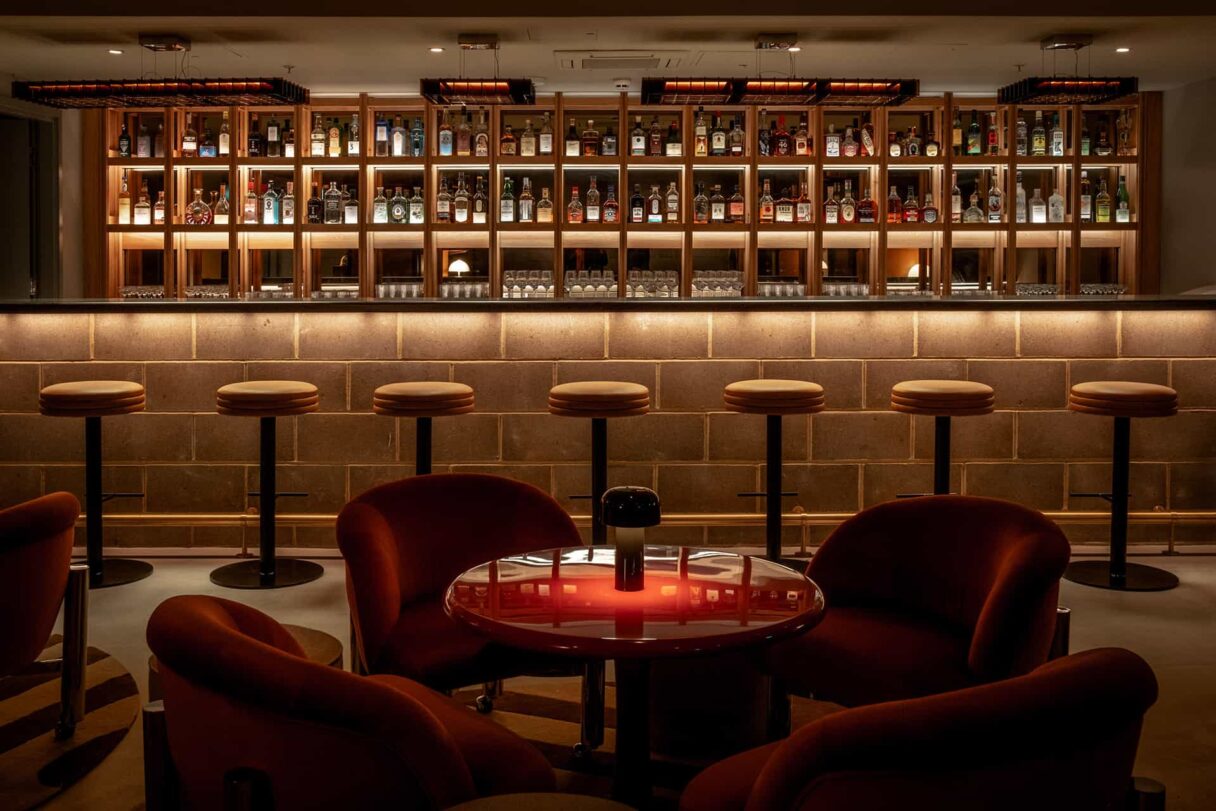
Jacu Strauss – designer, architect, and creative director of luxury hospitality brand Lore Group – did not, as you might imagine, have a cosmopolitan upbringing. He did not spend his formative years travelling between the world’s glitziest capital cities and experiencing the best of the international hotel, bar and restaurant scene.
Far from it, he explains, as we chat over Zoom, the freezing, early morning sunshine illuminating his office and bouncing off his cool blue frames and silvery hair like a spotlight he wasn’t quite prepared for. He grew up “covered in mud” deep in the Kalahari Desert, an expanse of sandy savanna in Southern Africa, just north of a city called Kimberley. With no internet and little opportunity for travel, he was inspired by the nature around him.
“It sounds so cliché,” he jokes, worried his answers are making him come across like a Miss World contestant. “But the incredible landscape around me was so inspiring. I had space to reflect on my thoughts, and plenty of time on my hands. I had to keep myself busy and that’s when I turned to painting, drawing, and creating.
“I always knew I wanted more than what was in front of me – as a teenager especially. Like all teenagers, I wanted the opportunity to do bad things!” Strauss also found creativity in music and film, which gave him greater insight into the world beyond the game reserve on which he lived. “I worked with the access I had,” he explains simply.

Strauss trained in architecture at the University of Westminster and UCL before working under super designer Tom Dixon. “He really opened my eyes to the world of design and its fundamental role in finding creative solutions for problems. Design isn’t about things, it’s about people.” He jokes that leaving was like a breakup – and has only praise and admiration for the industry icon.
Strauss was always motivated by a “desire to do more”, and still is. He joined Lore Group in 2018 (named after the word folklore, which means storytelling) and a slew of high-profile projects followed. One Hundred Shoreditch opened in early 2022, following the huge success of Sea Containers London, Pulitzer Amsterdam, Riggs Washington DC and Lyle Washington DC. “I am always looking to the next thing,” he says. “I want to do more, see more, create more.”
Each with its own look and feel, but all creatively directed by Strauss, the properties are tied by one common thread of DNA. “It’s about doing what is right as opposed to what’s trendy,” he explains. “It’s a philosophy, not a look. It’s being truthful and authentic to the building you are working with, whether that’s a brand-new glass skyscraper in New York or an old industrial building in Shoreditch.”


I ask where he looked for insight when redefining One Hundred Shoreditch’s look (the property was formerly the Ace Hotel), and how much the locality reflected his design choices. A Sloane Square resident, the area was very much “out of his comfort zone” but had an international reputation to uphold.
“Shoreditch has transformed so many times over the last few decades, and the space now reflects a much more grown-up city. We wanted to focus more on comfort, making it more democratic – appealing to a range of ages as well as backgrounds. But we also wanted to keep the fun factor.”
His favourite space is without a doubt the subterranean cocktail bar Seed Library: “a warm magical world with a residential feel.” The trick was to “humanise” the windowless basement, he explains. “It doesn’t matter who I take in there, they find something to respond to and leave with a smile on their face.”

He’s apologetic at not having an answer as to which great designers he admired growing up, and we joke again that this isn’t a Miss World acceptance speech. Instead, he cites up-and-coming artist friends, as well as historical, classical architects, as influences. He also refers to his grandfather who, as well as being a famous doctor, was an incredible creative and designer, patenting a range of medical tools and equipment.
“I thought he was going to be disappointed when I turned around and said I wanted to be a designer instead of going into medicine, but I think he was secretly jealous,” says Strauss. “He joked with me that, unlike being a doctor, a designer can’t bury his mistakes!” It’s a maxim that clearly stuck. Strauss explains one of his guiding principles is that being successful means “being incapable of walking away – you must live and breathe it.”

Image: Scaitboard
We discuss what’s next on the agenda, and it seems to be office spaces in the Big Apple, a ten-year project that Strauss has barely scratched the surface of. “It’s important to set the charter and philosophy now, so when it comes to choosing door handles in a decade’s time, we have a blueprint to refer to.” With hotels in Amsterdam and Washington DC, I wonder where is next on the map – but this man of the world says he’d truly be happy anywhere if it “felt right”. “We are long-term holders of property, so it must be multi-generational. I don’t have a cookie cutter.”
I ask what advice he would give to those starting out, or what he’d tell his “mud-covered” self with the benefit of experience and hindsight. “To be honest, I still wonder how I actually got here,” he laughs good-naturedly. “But I’d say don’t be too hard on yourself. To know that life, and design, aren’t always linear. It’s healthy to take a step back, to look at the bigger picture. Sometimes it’s ok to take the scenic route.”
100 Shoreditch High Street, Shoreditch, E1 6JQ, visit onehundredshoreditch.com
Read more: In conversation with Claudio Silvestrin, the godfather of contemporary minimalism
The post Jacu Strauss: The Lore Group creative director on creating the world’s coolest hotels appeared first on Luxury London.
